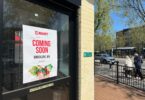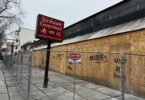By Siena Giljum
Boston University News Service
BROOKLINE – As COVID-19 cases rose throughout 2020, the fallout of the pandemic financially crippled families and individuals, causing food insecurity to reach a high unlike anything in living memory.
A national trend aimed at combating it has arrived at the Brookline-Boston border: the Fenway community fridge, which opened on Nov. 16 of last year.
Over the past 10 months, the COVID-19 crisis has drastically increased demand at food pantries nationwide, even those in areas oftentimes perceived as wealthier and less needy, like Brookline. Feeding America reported in October that the number of people experiencing food insecurity could rise to more than 50 million, or over 15% of the U.S. population.
Like other community fridges that have begun operation all over the Greater Boston area – including those in Allston, Roslindale, Somerville, and more – the Fenway fridge is a public space to donate and receive groceries at one’s leisure. The “Earthy Boston’” hutch, named after its associated social media account, sits in front of Chinese-American eatery Mei Mei. It features refrigerated space for perishable items and a few shelves for canned goods.
Fridge organizer Ariana Goncalves, who also runs the Instagram page Earthy Boston, felt a community fridge was the natural next step after a summer of turmoil related to both COVID-19 and social justice.
“I had this goal to do my part in tackling food inequality in the Boston area,” Goncalves said. “I didn’t have one specific location in mind, but knew I wanted to be in an area where I could reach the homeless population and low-income individuals.”
That’s when she connected with Mei Mei to build a more permanent program.
According to Chef Irene Li, Mei Mei prides itself on a long history of speaking up about social issues such as police brutality and food insecurity in its community.
“We were inspired by the grassroots nature of the community fridge movement,” Li said. “It’s definitely tied to our prior work around food justice and food insecurity.”
In addition to her head chef duties, she also serves as the owner and operator of the family-owned restaurant.
“In a time when restaurants are hurting, it’s nice to have something to offer our community, i.e., space and the extension cord,” Li said.
Other local businesses, such as Tatte Bakery & Cafe’s Brookline location and the Malaysian pop up series Sekali, have helped supply the fridge with food.

Goncalves said she and the Mei Mei team worked over the course of a month on design layout, construction and operation logistics before opening last month.
“It was very important to make sure we had a shed with a strong physical foundation, a team of volunteers open to helping run the fridge and the support of the Boston community,” the fridge organizer said.
While Mei Mei is just over the town border in Boston, Arielle Chernin, Brookline Food Pantry’s operations manager, argues that many would consider it part of Brookline. Chernin is also a close personal friend of Chef Li. Chernin has hosted several events for her “Congee & Me” food pop up at Mei Mei, an institution she considers part of the fabric of the Brookline community.
During the pandemic, there has been an increase in demand at the Brookline Food Pantry. Their pre-COVID-19 service of about 150 clients per week has more than quadrupled to about 700.
Chernin said that fridges like Earthy Boston’s are welcome additions to the ongoing solution for food insecurity and create a more relaxed “no questions asked” environment for people to accept donations.
Pantries are required to take down the information of every client they serve and report it to the state. Still, anyone can take a can of beans or head of lettuce from a community fridge – including those experiencing food insecurity for the first time.
The pantry also organizes three bags of groceries per family in need (one of canned and dry goods, one of produce and one of the refrigerated items). In contrast, community fridges are not intended to provide everything a person needs. They are a direct response to COVID-19 and an effort to build mutual aid networks. Pantries, however, predate the pandemic by several decades.
“Earthy Boston Fenway fridge has a goal to help close the food inequality gap and provide resources to anyone and everyone,” Goncalves said. “It’s powered for the community by the community to help any individual have access to basic human rights, such as food and hygienic items, without having to give a reason why [they need the assistance] or share their identity.”
Until working at the pantry, especially during COVID-19, Chernin said she was not aware of “how much of a disparity there was in Brookline between the top and the bottom [income households].”
Community fridges help bring awareness and visibility to the oftentimes unseen issue of food insecurity.
This article was originally published in the Brookline-Tab.





